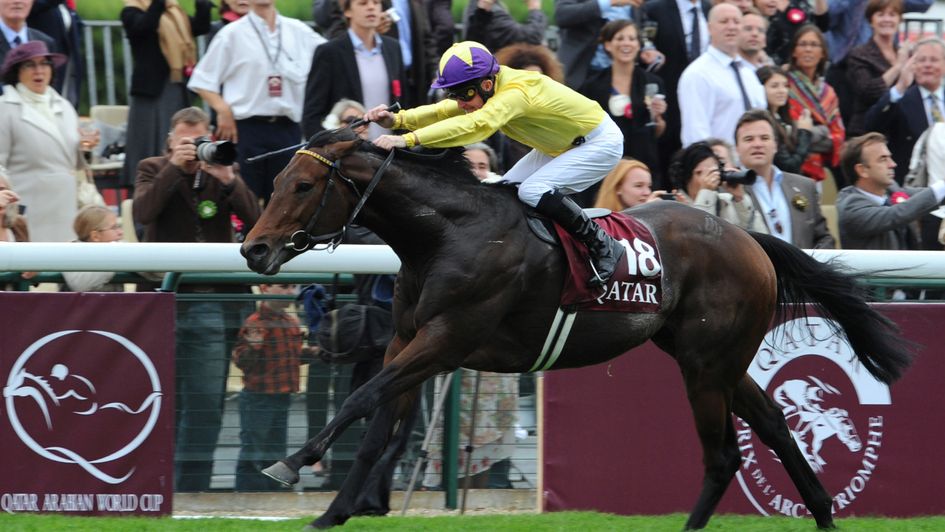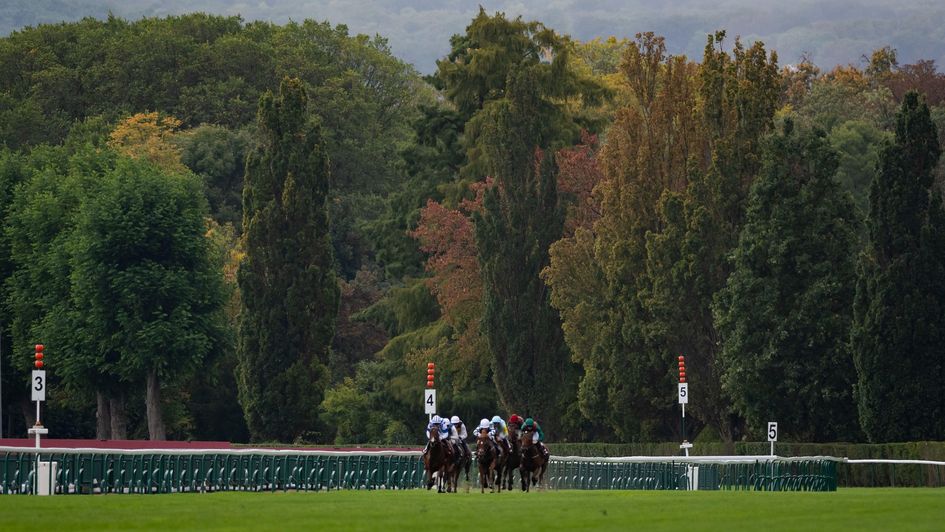John Ingles looks at the influence of Arc winner Urban Sea as a broodmare in the 30 years since she caused an upset at Longchamp.
Sea produces peak performance in strong Arc
Alpinista’s win in last year’s Prix de l’Arc de Triomphe maintained the excellent recent record in Europe’s richest race of fillies and mares who have won the majority of renewals since Zarkava was successful in 2008. The years between 1972 and 1983 saw another period of female domination when fillies or mares won eight editions of the Arc, including five in a row.
But in the 25 years between All Along and Zarkava, there was a strangely barren spell during which only one filly or mare was successful.
That was four-year-old Urban Sea, and her victory at PMU odds of 37/1 for the small dual-purpose stable of Jean Lesbordes in 1993 constituted a big upset. There were 15 Group 1 winners in the Arc field that year but Urban Sea wasn’t one of them. In fact, she hadn’t even run in a Group 1 during her four-year-old season until the Arc.
Instead, she’d had a varied campaign which included visits to Hong Kong, Royal Ascot and the provincial track of Le Lion d’Angers where she won a valuable listed contest which has since been named in her honour.
Her best run prior to the Arc that season came at Royal Ascot where she was beaten a neck in the then Group 2 Prince of Wales’s Stakes. Urban Sea arrived at the Arc bang in form, having also won a Group 3 at Deauville beforehand, she stayed a mile and a half (though hadn’t actually won at the trip before) and she was proven on soft ground which were the prevailing conditions that year, but there was no getting away from the fact that her CV looked pretty light compared with many of her rivals.
Heading the betting, for example, was the Prix du Jockey Club winner Hernando whose only defeat in his last six starts had come at the hands of Derby winner Commander In Chief (the main Arc absentee) in the Irish Derby.
That year’s Arc proved to be a roughish race with little pace early on, but despite sticking to the rails Urban Sea enjoyed a clear run under an excellent ride from Eric Saint-Martin and, after quickening into a narrow lead around a furlong out, she held on gamely by a neck from the Derby Italiano winner White Muzzle, trained by Peter Chapple-Hyam, who started at even longer odds.
They were followed home by that season’s Coronation Cup, Eclipse and King George winner Opera House, Oaks winner Intrepidity, Yorkshire Oaks winner Only Royale and St Leger winner Bob’s Return, with Hernando among those well beaten.
Urban Sea proved herself a high-class filly with a career-best effort at Longchamp under her optimum conditions, earning a Timeform rating of 126. But that made her only a modest winner by Arc standards, and she wasn’t even the highest-rated among her siblings; that honour belonged to her top-class half-brother King’s Best who won the 2000 Guineas seven years later and subsequently sired an Arc winner himself, Workforce.
That was only the beginning...
If her reputation had depended solely on what she did on the track, Urban Sea might have therefore gone down in racing history as one of the more forgettable Arc winners, but in the 30 years since – including in the years following her death at the age of 20 in 2009 - she has proven to be one of the most influential broodmares of modern times.
Later in 2009, her three-year-old colt that season, Sea The Stars, joined the all-time greats after an unbeaten campaign consisting of the 2000 Guineas, Derby, Eclipse, Juddmonte International and Irish Champion Stakes on the way to emulating his late dam by winning the Arc.
Sea The Stars carried the colours of Christopher Tsui, son of Urban Sea’s owner David Tsui. In contrast to his mother who hardly filled the eye – Urban Sea was leggy and sparely-made – Sea The Stars, taking much more after his sire Cape Cross in build, was a big, lengthy colt who developed really well physically as a three-year-old.
Sea The Stars would go on to be a very successful stallion but has been overshadowed in that career by the colt who’d been Urban Sea’s first Derby winner eight years earlier.
Without reaching quite the same heights on the track that Sea The Stars would attain, Galileo proved a top-class colt in his own right, going on to win the Irish Derby and King George after Epsom, and became a phenomenon at stud, winning twelve sires’ championships and having a current total of 99 individual Group/Grade 1 winners to his name.
While Sea The Stars and Galileo stood out among Urban Sea’s foals, her overall record as a broodmare was no less impressive. All nine of her foals to race earned Timeform ratings in excess of 100 (even the maiden Cherry Hinton who was runner-up in a Group 3), comfortably so in most cases, with their average rating being 119!
The others include Galileo’s brother Black Sam Bellamy, a Group 1 winner in Italy and in the Tattersalls Gold Cup (also sixth in the Arc, incidentally), My Typhoon, a Grade 1-winning mare in the USA, Irish Derby runner-up Born To Sea and Irish Oaks runner-up Melikah. The last-named was the product of two Arc winners as her sire was Lammtarra; her descendants include 2018 Derby winner Masar who has Urban Sea twice in his pedigree as he’s by Galileo’s son New Approach.
Urban influence spreads far and wide
Apart from being the dam of an Arc winner in Sea The Stars, Urban Sea has appeared in the pedigrees of several more recent Arc winners since thanks to Galileo. He’s the sire of 2016 winner Found (when Galileo had the first three) and 2019 winner Waldgeist, and the grandsire of Enable (2017/18) and Alpinista (2022) through his sons Nathaniel and Frankel. Galileo is also the sire of the dam of 2020 winner Sottsass.
That makes Germany’s 2021 shock winner Torquator Tasso the only Arc winner in the last seven renewals not to have Urban Sea in his pedigree, though even he has a close family connection as his great grandam Turbaine was Urban Sea’s half-sister! That’s a reminder that Urban Sea came from a German family, the same one, incidentally, which also produced Torquator Tasso’s sire Adlerflug.
There’s a very good chance that Urban Sea’s influence will be felt again to some extent in this year’s Arc. She’s fairly distant, though, in the pedigree of favourite Ace Impact who’s by Galileo’s grandson Cracksman. But he has an interesting pedigree as, in addition, his dam is by Prix du Jockey Club winner Anabaa Blue who is out of another of Urban Sea’s half-sisters, Allez Les Trois.
Through Galileo, Urban Sea also appears in the pedigrees of other leading Arc contenders Westover (bidding to become a second successive winner for Frankel) and, assuming he’s supplemented, St Leger winner Continuous who is out of a Galileo mare. Or could Galileo even have a third Arc winner of his own with Free Wind, who would also become her sire’s hundredth Group/Grade 1 winner?
Sea The Stars is yet to sire an Arc winner, though he has gone close with Cloth of Stars and Sea of Class both finishing runner-up to Enable. Hukum gives him every chance of putting that right this year after his brother Baaeed contested the Champion Stakes instead last season, while Emily Upjohn could give Sea The Stars another high-profile representative in the line-up.
More from Sporting Life
Safer gambling
We are committed in our support of safer gambling. Recommended bets are advised to over-18s and we strongly encourage readers to wager only what they can afford to lose.
If you are concerned about your gambling, please call the National Gambling Helpline / GamCare on 0808 8020 133.
Further support and information can be found at begambleaware.org and gamblingtherapy.org











